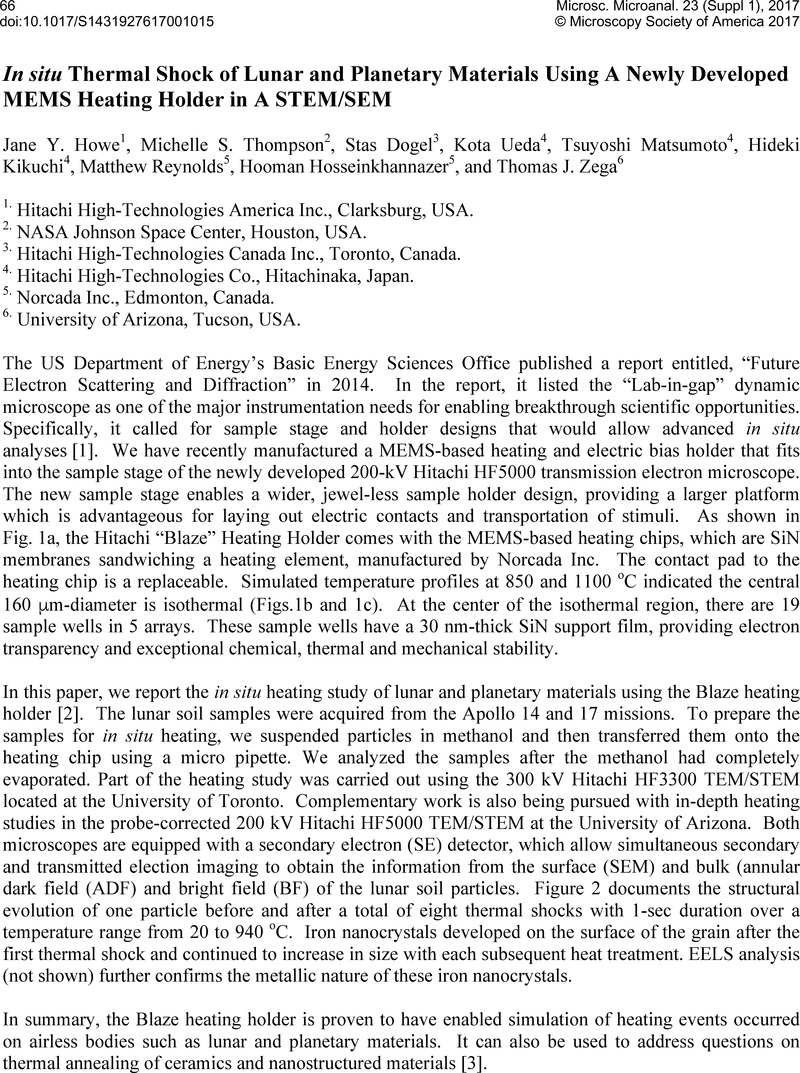Crossref Citations
This article has been cited by the following publications. This list is generated based on data provided by Crossref.
Yoon, Aram
and
Zuo, Jian-Min
2019.
Environment-Dependent Electron Beam Reduction of Rutile Nanocrystals at High Temperatures.
Microscopy and Microanalysis,
Vol. 25,
Issue. S2,
p.
1680.
El-Zoka, A.A.
Howe, J.Y.
Newman, R.C.
and
Perovic, D.D.
2019.
In situ STEM/SEM study of the coarsening of nanoporous gold.
Acta Materialia,
Vol. 162,
Issue. ,
p.
67.
Hetherington, Crispin
Jacobsson, Daniel
Dick, Kimberly A
and
Wallenberg, L Reine
2020.
In situ metal-organic chemical vapour deposition growth of III–V semiconductor nanowires in the Lund environmental transmission electron microscope.
Semiconductor Science and Technology,
Vol. 35,
Issue. 3,
p.
034004.
Muto, Atsushi
Dogel, Stas
Hosoya, Kotaro
Hosseinkhannazer, Hooman
Mahdi, Najia
and
Postek, Michael T
2021.
In situ Comparative heating and simultaneous multi-detector imaging at high and ultra-low landing energies.
Microscopy and Microanalysis,
Vol. 27,
Issue. S1,
p.
1642.
Qiu, Chenyue
Li, Mengsha
Dogel, Stas
Hosseinkhannazer, Hooman
Wang, Lu
Perovic, Doug
and
Howe, Jane
2022.
Real-time Analysis of Oxygen Vacancy of Indium Oxide via Environmental Transmission Electron Microscopy.
Microscopy and Microanalysis,
Vol. 28,
Issue. S1,
p.
1868.
Tornberg, Marcus
Maliakkal, Carina B
Jacobsson, Daniel
Wallenberg, Reine
and
Dick, Kimberly A
2022.
Enabling In Situ Studies of Metal-Organic Chemical Vapor Deposition in a Transmission Electron Microscope.
Microscopy and Microanalysis,
Vol. 28,
Issue. 5,
p.
1484.
Kim, Mikang
Kim, Namdong
Hosseinkhannazer, Hooman
Kim, Ki-Jeong
and
Shin, Hyun-Joon
2022.
In-Situ High-Temperature Heating Setup for Spectronanoscopy at Pohang Light Source.
Applied Science and Convergence Technology,
Vol. 31,
Issue. 1,
p.
9.
Oshime, Norihiro
Ohwada, Kenji
Machida, Akihiko
Fukushima, Nagise
Ueno, Shintaro
Fujii, Ichiro
Wada, Satoshi
Sugawara, Kento
Shimada, Ayumu
Ueno, Tetsuro
Watanuki, Tetsu
Ishii, Kenji
Toyokawa, Hidenori
Momma, Koichi
Kim, Sangwook
Tsukada, Shinya
and
Kuroiwa, Yoshihiro
2022.
The ferroelectric phase transition in a 500 nm sized single particle of BaTiO3 tracked by coherent X-ray diffraction.
Japanese Journal of Applied Physics,
Vol. 61,
Issue. SN,
p.
SN1008.
Maliakkal, Carina B
Jacobsson, Daniel
Tornberg, Marcus
and
Dick, Kimberly A
2022.
Post-nucleation evolution of the liquid–solid interface in nanowire growth.
Nanotechnology,
Vol. 33,
Issue. 10,
p.
105607.
Matsumoto, Hiroaki
Sato, Takeshi
Igarashi, Keisuke
Hashimoto, Takahito
and
Inada, Hiromi
2023.
In-situ Observation of Chemically Reacted Particles in Gas Atmosphere with an Aberration Corrected STEM/SEM.
Microscopy and Microanalysis,
Vol. 29,
Issue. Supplement_1,
p.
122.
Oshime, Norihiro
Ohwada, Kenji
Machida, Akihiko
Fukushima, Nagise
Shirakawa, Kosuke
Ueno, Shintaro
Fujii, Ichiro
Wada, Satoshi
Sugawara, Kento
Shimada, Ayumu
Ueno, Tetsuro
Watanuki, Tetsu
Ishii, Kenji
Toyokawa, Hidenori
Momma, Koichi
Kim, Sangwook
Tsukada, Shinya
and
Kuroiwa, Yoshihiro
2023.
Lattice strain visualization inside a 400 nm single grain of BaTiO3 in polycrystalline ceramics by Bragg coherent X-ray diffraction imaging.
Japanese Journal of Applied Physics,
Vol. 62,
Issue. SM,
p.
SM1022.
Andersen, Christopher R. Y.
Tornberg, Marcus
Lehmann, Sebastian
Jacobsson, Daniel
Dick, Kimberly A.
and
Mølhave, Kristian S.
2024.
Microheater Controlled Crystal Phase Engineering of Nanowires Using In Situ Transmission Electron Microscopy.
Small Methods,



